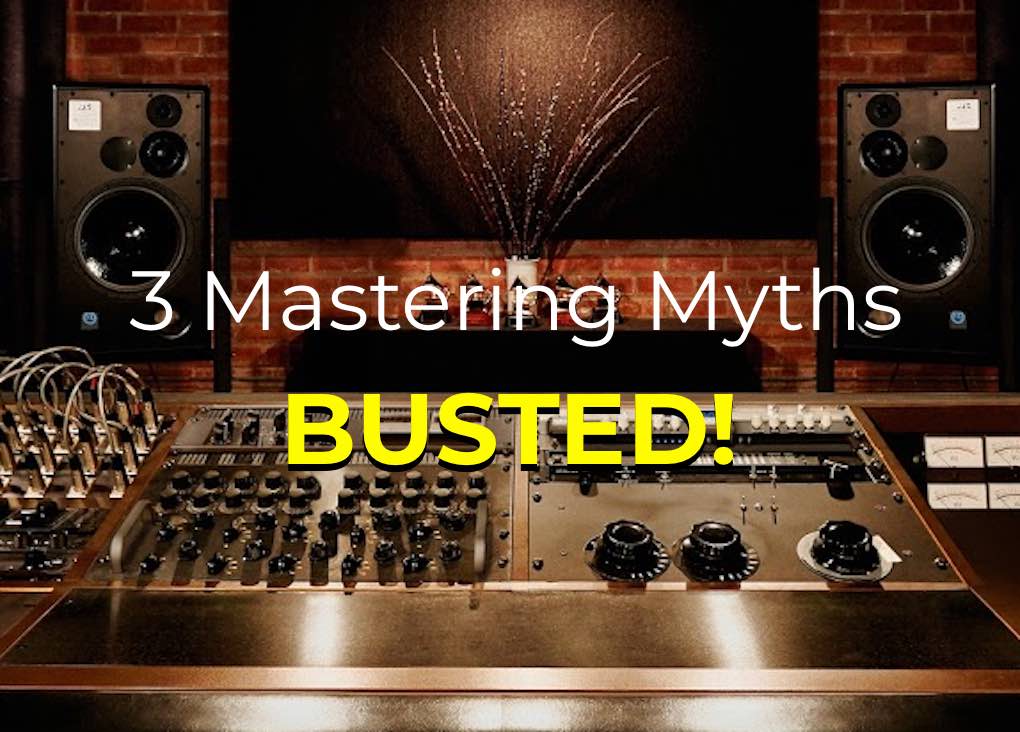- in Production by Bobby Owsinski
Busting 3 Big Mastering Myths
Just as mixing has changed through the years, so has mastering. That said, there are so many mastering myths today, and they keep on getting reinforced thanks to all the mastering plugins available. Let’s bust 3 of the big mastering myths (there are many more) in order to help you think about the art of mastering a little differently.

Myth #1: Mastering is all about adding EQ and compression.
BUSTED! Mastering is the process of fine-tuning the level, frequency balance, and metadata of a track in preparation for distribution. This is what professional mastering engineers do, adding a surprising small amount of processing to get big results. The trick, of course, is when and where to apply those amounts.
The unsung jobs of the mastering engineer include:
- Transferring the master to a different medium. Mastering engineers where originally called “transfer engineers” because they transferred the songs on tape to vinyl. That’s no different today when a mastering engineer transfers a digital file to vinyl or CD, or even to the Apple Digital Masters format (something only a certified facility can do).
- Making your mix competitive with other releases. You want your mix to at least sound like it’s in the ballpark with other mixes in your music genre.
- Making all the songs in an album sound like they belong together. Even the best mixers find that some songs sound a little different after mixing an album. One of the jobs of the mastering engineer is to make sure that they sound similar in relative level and tone so they fit together for a better listener experience.
- Catch the things that you missed. It’s easy to miss things as an engineer that an experienced mastering engineer will catch. This include distortion, frequency response problems, bad fades, and mix level problems.
Myth #2: I Can Do Everything A Mastering Engineer Can Do
BUSTED! Your tools are limited.
- You only have some of the tools they have. Most mastering engineers have specialty (and expensive) plugins, analog and digital outboard gear, and real tape machines.
- Their playback environment is waaay better. Many can hear a change as little as a tenth of a dB. Can you?
- They have lots of experience. They listen to good and bad songs in every genre of music all day, every day. They know what works and what doesn’t. When I ask mastering engineers on my podcast how long it took them to get good at the job, they typically say about 5 years.
- It’s difficult to master on the same speakers that you mixed on. Every speaker has deficiencies, and you just compound them when you master on the same ones.
Myth #3: Mastering Will Automatically Make My Mix Sound Better.
BUSTED! Don’t believe the hype.
It’s not a panacea. Mastering (especially mediocre mastering or self-mastering) will not automatically give you a “major label” sound.
- It’s just as likely to screw up your mix as it is to help it. If you’re in the business long enough then you’ve experienced just how often mastering will go the opposite of what you think.
- Don’t expect miracles. They happen every once in a while, but not often. Mastering alone cannot compensate for a bad mix.
- It can be like putting lipstick on a pig. You can dress it up but it’s still a pig. Same with a bad mix. You can master it but it will still be a bad mix.
- Mastering engineers often send mixes back. If they feel they can’t do a good job because the mix balance or frequency response is off, they’ll ask the mixer for a better mix.
Nothing replaces experience, of course, and it’s totally true that the more you mix or master the better you’ll get at it. It also helps to know the fundamentals and techniques, and hopefully you’re learning these already at BobbyOwsinskiCourses.com or in one of my webinars or workshops.
In the meantime, keep your ears open, listen to everything you can, and approach mastering with reverence, because it is indeed an art.
